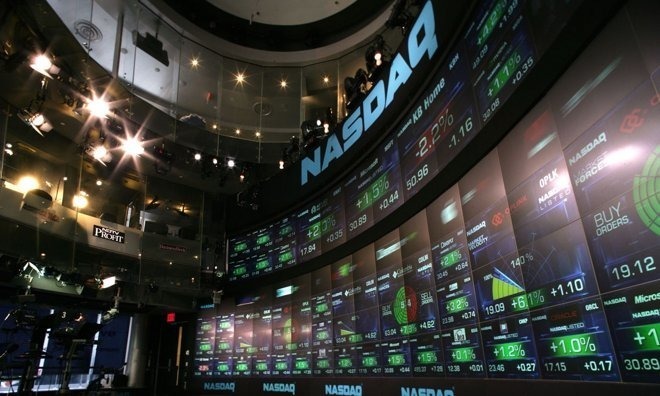Riding a wave of positive financial news and a rosy outlook for fiscal 2017, Apple stock touched $136.74 in intraday trading on Tuesday before closing at an all-time high of $136.70.
The finish continues a string of record-breaking trading days for Apple that began on Feb. 13, when AAPL stock ended the day at $133.29. A day later, shares reached $135.01 as Apple's market capitalization blew past $700 billion for the first time since 2015. The company's market cap stood at $719.19 billion at the end of trading today.
Prior to Tuesday, Apple most recently reset its trading high on Friday after company shares turned in a performance of $135 at the end of trading.
Partially driving today's stock surge was a research note from Morgan Stanley in which analyst Katy Huberty had raised her price on AAPL to $154, up from a previous target of $150, reports Business Insider.
Explaining the uptick to investors, Huberty called fears of a supposed decline in Chinese iPhone demand overblown, saying the company "is positioned to take net users from local Chinese smartphone brands." She forecasts one in five users who currently own a local brand smartphone could make the switch to Apple's platform. Considering the region's gigantic subscriber base, Apple stands to gain a huge number of new users over the next few quarters.
Huberty's note appears to be in direct response to Chinese market sales estimates research firm Canalys released last week. According to the report, Apple shipped 43.8 million iPhones in China during the December quarter, down 18.2 percent year-over-year. The figure put the company in fifth place behind Chinese manufacturers Huawei, Oppo, Vivo (a subsidiary of BBK) and Xiaomi, respectively. Independent findings published by IDC earlier this month also reflect an increase in local producer marketshare, but place Apple in fourth place ahead of Xiaomi.
Apple itself noted an 8 percent decline in China sales for its first fiscal quarter of 2017, with CEO Tim Cook blaming the slip on a weak yuan and a difficult Hong Kong market. Cook was quick to note Apple's Chinese numbers were actually up six points year-over-year on a "constant currency" basis.
Like other analysts, Huberty expects Apple's 2017 iPhone update to be a major revenue driver in China and beyond. Apple is widely rumored to launch an "iPhone 8" model this fall that will come packed with advanced technology like an edge-to-edge OLED display, wireless charging and a "glass sandwich" design. Recent predictions from analyst Ming-Chi Kuo point to the inclusion of a so-called "function area" that will take the place of a physical Touch ID home button, as well as a special front-facing camera with 3D mapping capabilities.
The forthcoming iPhone's bleeding edge design and feature additions will likely help Apple gain ground in China, a region that is "especially sensitive to new technology and form factor changes," Huberty said in today's note.
 AppleInsider Staff
AppleInsider Staff







-m.jpg)






 Christine McKee
Christine McKee
 Malcolm Owen
Malcolm Owen
 Marko Zivkovic
Marko Zivkovic

 Andrew Orr
Andrew Orr
 Andrew O'Hara
Andrew O'Hara
 William Gallagher
William Gallagher





-m.jpg)



27 Comments
Just a reminder that back in 2015 Apple had reached a market cap value of around $775B and yet in 2016 slid down to around $530B which was below surging Alphabet's market cap and everyone knew then Apple was doomed, never to return to its former self. Anyway, Apple still has a distance to go to get back to its former market cap glory.
Fortunately, during the past couple of years Apple has bought back about 2 billion shares which should make those dividends stretch a little further. There are Wall Street pundits saying how Apple is cheating to make it's EPS look higher than it should be due to those missing shares. Oh, well. You can't satisfy everyone. So many people seem concerned about Apple not being able to pay increased dividends to shareholders yet no one is concerned that Microsoft, with far more outstanding shares, being able to pay its dividends. So goes the bias against Apple. As a shareholder, I hope Apple can continue this run for awhile before Wall Street again turns on Apple.
Apple has plenty of cash to increase its dividend. If they could repatriate the cash at a decent rate they wouldn't have to sell bonds to raise the funds but even then the bonds are cheaper than the lowest repatriation rate I've seen quoted so we'll see what management does.
We have to accept that Apple has a double standard against it. They have to outperform and out innovate by 5:1 in order for these analysts to not dump the stock. Everyone else somehow blows smoke and sees stock price increases. Just look at the P/E ratios for some of these companies in comparison. Why does MSFT (and Alphabet) have a P/E of 30? Did they announce a cure for cancer? The highest P/E AAPL has had in the last five years was 18.5. Total market bias.
Through 2013 - 2015, into early 2016, there was a significant amount of institutional investor fear that Android would win the mobile OS race. These analysts equate market share with winning. My impression is that the endgame of that race is evident in the US and other maturing markets. By providing the best security and ecosystem in beautiful, reliable devices, Apple is proving to be the solid bet. No company suffers more from manipulation and being misunderstood. Solid value is kind of hard for wall street folks to comprehend. We still need at least one new, amazing product this year to maintain share price momentum.